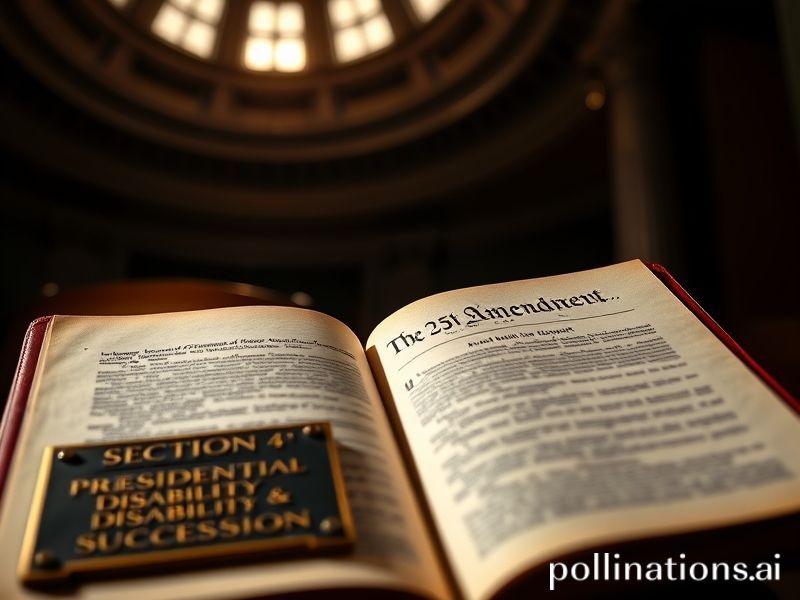Ctrl-Alt-Del: How the World Watches America Flirt With Its 25th Amendment Fire Alarm
The 25th Amendment: America’s Impeachment-Adjacent Happy Meal
By Pascal “Pax” Marais – Senior Cynic-at-Large, Dave’s Locker
PARIS — While the rest of the planet wakes up to the comforting smell of diesel and existential dread, Washington occasionally flirts with the 25th Amendment, that constitutional escape hatch designed for when the guy with the nuclear codes starts live-tweeting launch coordinates. To foreign observers—who already view U.S. politics as prestige-series melodrama subsidized by arms sales—the 25th is less a legal clause and more a periodic reminder that even superpowers keep a fire axe behind glass labeled “Break in Case of President.”
The amendment, ratified in 1967 after the Kennedy assassination left America briefly leaderless and clinically paranoid, is essentially Congress installing a “Ctrl-Alt-Del” key for the executive branch. It allows the Vice-President plus Cabinet to declare the President “unable to discharge the powers and duties of his office,” a phrase elastic enough to cover anything from a stroke to a four-day Twitter bender. Should the President object, Congress has 21 days to decide by two-thirds vote whether to uphold the coup-ish intervention or return the launch codes to the tantrum in progress.
From Berlin to Bangkok, diplomats treat every 25th-Amendment buzz like a surprise fire drill: rehearse the evacuation route, then pretend it never happened. When it was last brandished—after the U.S. Capitol briefly resembled a LARP session gone feral—European allies quietly updated their Washington contingency plans from “wait for adults” to “assume none exist.” Meanwhile, China’s state media ran helpful explainers titled “How Democracies Self-Defenestrate,” accompanied by soothing animated pandas.
The global stakes are not theoretical. The President still chairs the National Security Council, still signs Treasury warrants that keep the dollar the world’s reserve currency, and still has the football that can end history before the markets close. When investors from São Paulo to Singapore hear “25th Amendment,” algorithms translate it into one phrase: “American risk premium.” Cue overnight spikes in gold, crypto, and canned-goods equities.
Emerging markets, ever the abused children of global finance, watch the spectacle with black humor. “You have a constitutional self-eject button?” laughed a Kenyan central-bank official, sipping lukewarm coffee during another IMF Zoom. “We can’t even get our parliament to agree on lunch.” In Delhi, analysts note that India’s own succession rules require nothing more than a party circular and a brief apology to the outgoing PM—far tidier, though less Netflix-worthy.
Yet the 25th’s most exquisite irony is how it weaponizes America’s favorite export: management jargon. The Cabinet must submit a “written declaration” that the boss is “unable to discharge duties,” a phrase HR departments worldwide recognize as code for “toxic star performer who keeps groping the interns.” Only in D.C. does that memo come with constitutional force and a side of potential martial law.
Should the mechanism ever succeed, the world would witness a first: a peaceful, bureaucratic decapitation broadcast in real time to 195 countries, complete with cable-news countdown clocks. Foreign ministries would scramble to update their leader-to-call lists, while the Pentagon’s 800 overseas bases would hold their breath, hoping the new signature on the nuclear launch card resembles the old one.
And if it fails—if Congress reinstates the very chaos the Cabinet tried to eject—the spectacle mutates into global tragicomedy. Picture EU officials drafting memos titled “Guidelines for Trading with a Rogue Superpower,” or the Kremlin circulating a bingo card of U.S. constitutional crises (square B-3: “President barricades himself in Oval Office, livestreams from Resolute Desk”).
In the end, the 25th Amendment is less a safeguard than a Rorschach test: Americans see a solemn constitutional remedy; the rest of us see a nation that wrote its own ejector seat instructions, then tacked on a 21-day return policy. It reassures allies that checks exist, and terrifies them that the checks require the checked to sign off. So we watch, popcorn in hand, currencies hedged, wondering whether the world’s oldest democracy will calmly press Ctrl-Alt-Del or accidentally reboot the planet. Either way, the memes will be fire—right up until the actual fire.







